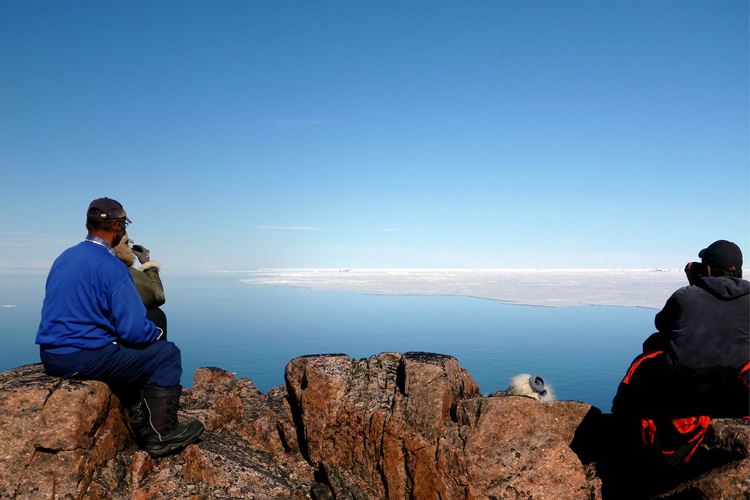News

Press release - April 2017
| by: Commission
Pikialasorsuaq Commission applauds Simon's support for an Inuit led management area in the Pikialasorsuaq
New York - Mary Simon, Minister Caroline Bennett's Special representative released her final report today. The report has many important messages and recommendations for government to improve the lives of Inuit. For the Pikialasorsuaq Commission one recommendation stood out. Simon recommended that Canada accept the Pikialasorsuaq Commission's recommendation for the creation of an Inuit-led management plan and monitoring process for the entire North Water Polynya and consider recognizing the region as an IPA (Indigenous Protected Area).
Okalik Eegeesiak, International Pikialasorsuaq Commissioner and Chair of ICC stated, "Conservation of Arctic marine regions is important for Inuit and we welcome the recommendation in Ms. Simon's report to accept the Pikialasorsuaq recommendation to create an Inuit led management area and monitoring regime for the entire Pikialasorsuaq or North Water Polynya."
Eva Aariak, Canadian Pikialasorsuaq Commissioner offered, "Inuit are a marine people dependent on the Arctic ocean for our transportation and its marine resources for our food security. Inuit life today, is dependent on movement, and that movement happens over the Arctic sea ice and on the open ocean. We rely on free movement in order to eat, to obtain supplies for our traditional clothing, to keep our rich cultural heritage alive, through such things as art. This movement takes place on the sea ice that surrounds and connects Inuit communities. During winter, our highway is sea ice. During summer, it is the open sea. This connection to land and sea gives Inuit a great sense of pride, community well-being, and a spiritual connection to the past."
"Our children no longer know the place names of our hunting grounds, nor have they traveled across the ice bridge that links these lands "- "This is what we are hearing in communities that surround the Pikialasorsuaq," added Kuupik Kleist, Pikialasorsuaq Commissioner from Greenland. The Pikialasorsuaq, or the "Great Upwelling" is the largest Arctic polynya and the most biologically productive region north of the Arctic Circle. Pikialasorsuaq has been recognized by Inuit for generations as critical habitat. Communities in the Qikiqtani and Avanersuaq regions in Canada and Greenland rely on the polynya's biological productivity. The Pikialasorsuaq is vital to many migratory species upon which these communities, as well as global species, depend. In some recent years, the northern ice bridge in Kane Basin, Nares Straight and Smith Sound (Ikeq) has become less reliable and the polynya less defined. The consequences of these changes, linked to larger climatic shifts observable in many parts of the Arctic, are not known.
Eegeesiak said, "ICC initiated the Pikialasorsuaq Commission to address an ecosystem that has supported Inuit communities for millennia and one that is at risk from climate change and industrial and shipping activities". The Pikialasorsuaq Commission's goal is to provide a body of evidence, key principles and recommendations to make certain Inuit are central to the future of the Pikialasorsuaq and an Inuit vision of the management of the area is implemented.
The intricate sophistication of Indigenous knowledge and understanding of the region can be mobilized and integrated in multiple, innovative ways. Our northern most communities rely on the Pikialasorsuaq and participated in the fall 2016 hearings and have called for Inuit led management and monitoring of this important marine area.
"The Commission is developing a framework for an Inuit led monitoring plan that will ultimately support Indigenous knowledge to Indigenous policy/control as a central concept of Inuit led management and further for Indigenous Protected Areas (IPAs) to be a novel and effective approach to self determination," noted Kleist.
Kleist followed, "The Commission visited both the Canadian high Arctic communities of Grise Fiord and Pond Inlet and heard from knowledge holders from Resolute Bay, Clyde River and Arctic Bay. We also travelled to Qaanaaq and Siorapaluk—the most northern communities in the world and down along the coast of Melville Bay to the other Greenland settlements that depend on the Pikialasorsuaq. Most of these beautiful villages in this region lack airstrips. The sea is their link to the outside world."
The hunters of all these communities generously shared with the Commission their knowledge. Recurring themes included; instability, unpredictability, changes in migration patterns, new species, open water where there should be ice. They also talk of political change. Of artificial borders that separate them from a time not so long ago when they could still travel across the polynya's great ice bridge that links Umimmat Nunaat (Ellesmere Island) and Greenland, linking these eastern communities of Pikialasorsuaq to the hunting grounds on Ellesmere.
Eegeesiak said, "As we heard from every community Inuit here are best placed to monitor and manage this region. The communities want to lead and set the research agenda, study the indicators of change and establish more realistic hunting regulations that will sustain their communities. Inuit on both sides are expressing a strong desire for free movement, once again, of Inuit across Pikialasorsuaq and increased cooperation to arrive at a common vision for shared resources and Inuit-led management of Pikialasorsuaq. Similar concerns over increased tourism, shipping, fishing, resource exploration and seismic testing are being heard on both sides of Pikialasorsuaq. Most emphatically, Inuit want to rebuild a caretaking regime for the polynya together as Inuit living, though divided by country, from one sea."
Aariak said, "For Inuit the sustainable use of the marine resources and the future of the Arctic ocean and sea ice is not a luxury - it is life itself, it is about protecting our culture. Inuit are adapting to the changes and we will continue to thrive in the changing Arctic."
- Read Mary Simon's report - A new Shared Arctic Leadership Model
For more information
Carole Simon ICC Canada
csimon@inuitcircumpolar.com
613-563-2642
Stephanie Meakin ICC Canada
smeakin@inuitcircumpolar.com
613-791-1925